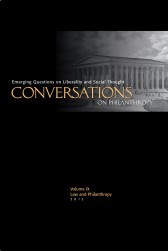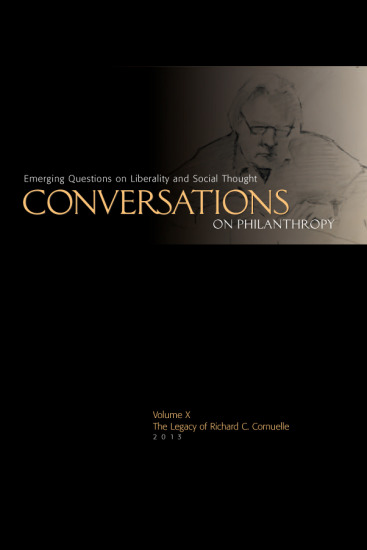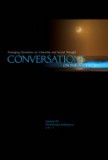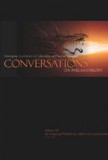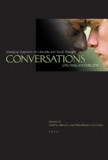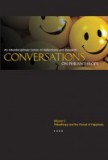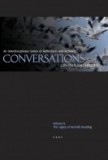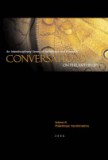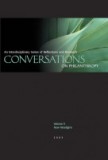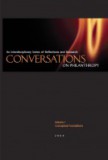Interested in learning more? Subscribe to our mailing list.
Conversations on Philanthropy is an annual publication of The Philanthropic Enterprise. Seeking to ignite reflection and discussion on the role of beneficence in the social order, Conversations features academic papers, essays, and reviews by scholars, philanthropists, and social entrepreneurs
Volume IX - Law & Philanthropy, 2012
Introduction ![]() [+]
[+]
This volume of Conversations on Philanthropy grew out of papers presented at a 2011 scholarly colloquium on The Law of Charity: History, Theory, and Social Practice. It was unintentional, but the papers gathered for this conference seemed, upon reflection, both to amplify the importance of and reveal a lacuna in Harold Berman’s magisterial study of the Western legal tradition presented in Law and Revolution: The Formation of the Western Legal Tradition and Law and Revolution II: The Impact of the Protestant Reformations on the Western Legal Tradition. To identify the lacuna requires a careful look at Berman’s focus on the implications of the Lutheran Reformation; consider this passage from the first volume of Berman’s study: Read More...
Contributors ![]() [+]
[+]
ROBERT E. ATKINSON, JR. (ROB) is a native of Kingstree, South Carolina, and a graduate of Washington and Lee University (History and Philosophy, 1979). After receiving his law degree (Yale 1982), he clerked for Judge Donald Stuart Russell of the United States Court of Appeals for the Fourth Circuit. He practiced estate planning and nonprofit organizations law with Sutherland, Asbill & Brennan’s Washington, D.C., office before joining the faculty at the Florida State University College of Law, where he has taught property, professional responsibility, law and literature, and nonprofit organizations, and where he writes and lectures on philanthropy and on the legal profession.
TODD BREYFOGLE is Director of Seminars for the Aspen Institute. He earned a BA in Classics-History-Politics from Colorado College before attending Corpus Christi College, Oxford (as a Rhodes Scholar), where he read Ancient and Modern History (BA) and Patristic and Modern Theology (MSt). He earned his PhD as a Century Fellow and Javits Fellow at the University of Chicago’s Committee on Social Thought. He is the editor of Literary Imagination, Ancient and Modern: Essays in Honor of David Grene (University of Chicago Press, 1999), and has authored articles ranging from Augustine to J. S. Bach to contemporary political theory. Before joining the Aspen Institute, he directed the Honors Program at the University of Denver. He has lectured at universities in the US, Canada, the UK, and India, including Oxford, Cambridge, Princeton, Dartmouth, and the University of Chicago. He serves on several non-profit boards and is a Senator of the Phi Beta Kappa Society.
ILARIA ANNA COLUSSI is a PhD Candidate in Public Law at the Doctoral School of Comparative and European Legal Studies, University of Trento (Italy). She also collaborates with the European Centre for Law, Science and New Technologies (Pavia) and is a member of the project “Biolaw” within the Department of Legal Science of the University of Trento. Her main research interests concern the legal aspects of synthetic biology, the relationship between genetics and the law, with a specific attention to biobanks and forensic DNA databanks. She has published several articles in Italian Law journals and chapters within books (such as “Biotech Innovations and Fundamental Rights,” published by Springer, 2012). Moreover, she has participated, as a speaker, at conferences and seminars all over the world. She has recently carried out research periods at the Oxford Uehiro Centre for Practical Ethics (Oxford, UK) and at the Inter-University Chair in Law and the Human Genome, University of Deusto (Bilbao, Spain).
WILLIAM DENNIS, now an independent consultant in philanthropy in McLean, Virginia, has spent most of his career working at nonprofit tax-exempt institutions. He has also gifted conservation easements on family property to a nonprofit organization.
STEVEN GROSBY is professor of religion at Clemson University. His recent books include Nationalism: A Very Short Introduction (Oxford, 2005) and, as editor, Edward Shils, A Fragment of a Sociological Autobiography (Transaction, 2006). He is also a contributing editor to Conversations on Philanthropy.
DAVID F. HARDWICK is Professor Emeritus, Pathology and Pediatrics at The University of British Columbia; the Secretary of the International Academy of Pathology and Associate Editor of Modern Pathology. He currently serves on the Board of Governors of British Columbia Children’s Hospital Foundation and has been intimately involved in the interrelationship of Government and the British Columbia Children’s Foundation in the creation of new Children’s Hospital facilities. He has published numerous books and papers on organizational and administrative systems the latest being a series of papers (co-authored with Leslie Marsh) on the relationship between the market and science, notably “Science, the Market and Iterative Knowledge“ (Studies in Emergent Order, Vol. 5, 2012) and "Clash of the Titans: When The Market and Science Collide" (in press, Advances in Austrian Economics, Vol. 17, Emerald).
RICHARD HELMHOLZ is Ruth Wyatt Rosenson Distinguished Service Professor in the Law School of the University of Chicago. A legal historian, he has specialized in the study of Roman and canon laws. His principal contribution has been to show their relevance to the development of the Anglo-American common law. Among his publications on the subject, the two most recent are Volume One of the Oxford History of the Laws of England: The Canon Law and Ecclesiastical Jurisdiction from 597 to the 1640s (2004), and Three Civilian Notebooks, 1580-1640 (Selden Society 2010).
JOSEPH ISAAC LIFSHITZ is a Senior Fellow in the Department of Philosophy, Political Theory, and Religion. He received his PhD in Jewish Thought from Tel Aviv University. In his study of Jewish philosophy and history, his main focus is on the philosophy and history of Ashkenaz in the high Middle-Ages. His book Judaism, Law and the Free Market, was published by Acton Institute on May, 2012.
LESLIE MARSH is a Research Associate in the Dean’s Office (Medical School) at The University of British Columbia and was previously Assistant Director of The New England Institute for Cognitive Science and Evolutionary Studies. His work is primarily located at the interface of mind, sociality and liberality with an active interest in the philanthropic world. He is the founder of the journal EPISTEME: Journal of Individual and Social Epistemology (Cambridge); is currently working on a monograph Stigmergic Cognition: Socializing Cognition and “Cognitivizing” Sociality (Springer); is the co-editor of A Companion to Michael Oakeshott (forthcoming, Penn State); and is the editor of Hayek in Mind: Hayek's Philosophical Psychology.
ADAM MARTIN is a lecturer in political economy at King’s College, London. After receiving his PhD in Economics from George Mason University in 2009, he was a post-doctoral fellow at the Development Research Institute at New York University. He can be reached at [email protected] and more information can be found on his website, adamgmartin.com.
GEORGE McCULLY served for twenty years as professor of European intellectual and cultural history, from the Renaissance to the Enlightenment, and for twenty-five years as a professional philanthropist—fundraiser, strategic planner, executive director, trustee, and advisor to charities, foundations, families and individual donors. In 1997 he created the highly respected and influential Massachusetts Catalogue for Philanthropy, to promote charitable giving and strengthen the culture of philanthropy through donor education. His book, Philanthropy Reconsidered (2008), presents a comprehensive overview of the "vocabulary, conceptualization, and rhetoric" of philanthropy from the ancient coinage of the term in Prometheus Bound, to its essential role informing the American Revolution and Constitution, to the paradigm-shift transforming philanthropy today. His latest work is the Massachusetts Philanthropic Directory—an on-line, systematically taxonomized, analytical directory to all the philanthropic charities of (initially) Massachusetts, which comprise only 1/7th of the state's "nonprofits." This dramatically innovative Directory system will be extended nationwide over the next two years. He is also a contributing editor to Conversations on Philanthropy.
JOHN E. MURRAY is Joseph R. Hyde III Professor of Political Economy at Rhodes College in Memphis, Tennessee. He has written on public and private approaches to poverty, poor relief, and income maintenance in a variety of places and times. His books include Origins of American Health Insurance (Yale University Press, 2007), Children Bound to Labor (Cornell University Press, 2009), and The Charleston Orphan House (University of Chicago Press, 2013).
ROBIN ROGERS is an associate professor of sociology at the City University of New York and has served as a Congressional fellow on public policy.
JOHN T. THOMAS, Esq., J.D. Vanderbilt University School of Law, 1990, is health care executive and a tax lawyer by training and practice. He has served as in-house counsel to both the Sisters of Mercy Health System and Baylor Health Care System and has represented other nonprofit health care organizations. While serving as general counsel for Baylor, he testified before the U.S. House of Representatives Ways and Means Committee on May 23, 2005, about the structure of the Texas charity care law and the differences between nonprofit hospitals and taxable hospitals in their service to the community.
Symposium on Tax Exemption
Essays
—William C. Dennis
Already in America, government is tightening its grip on the independent sector. It is challenging the tax-exempt status of foundations making new efforts to “regulate” almost all private groups. An independent sector “regulated” by its competition has, at best, an uphill fight on its hands. . . . The foundation is an instrument forged by citizens who transfer profit from the commercial sector and put it directly to work as risk capital for the general betterment of the society. To say or imply that the foundation exists only on the sufferance of government is to reason from the premise that government is the whole of society.
—Richard C. Cornuelle, Reclaiming the American Dream
The late economist Benjamin A. Rogge used to talk of “Rogge’s World,” that ideal arrangement of institutions which he would have established had he been in charge (not that he would have agreed to be put in charge if asked). This was a thought experiment he used to consider the implications of better social configurations from a free-market perspective. Rogge, I think, was aware of how difficult and even dangerous it is to approach social reform in a constructivist mode, because of unintended consequences and secondary effects. Institutions have been built up over long periods of time, and countless individuals have made life choices on the basis of existing arrangements. For many, radical changes will bring unexpected and undesired difficulties that will not be obviously balanced by the theoretically improved institutional setting. Nevertheless, thought experiments exploring ideal worlds can demonstrate interesting possibilities and help guide more incremental change. Read More...
—Robert E. Atkinson, Jr.
The U.S. Internal Revenue Code’s charitable exemption and deduction clearly treat philanthropy favorably; the question for tax theory has always been why, and how well. The traditional subsidy theory has offered no means of comparing the relative goodness of one philanthropic purpose with another, or of comparing philanthropic providers of a good or service with alternative suppliers in the for-profit or governmental sectors. It simply has accepted that all philanthropy, whatever that is, is good, and deserving of favorable tax treatment.
This seems, on its face, to be a serious deficiency, if not an outright vice. On closer inspection, however, we can see it to be an odd virtue born of the need to fit our understanding of charity to our capitalist market economy on the one hand and our liberal democratic polity on the other. If our philanthropy is to be both consumerist and populist, it must be agnostic about both human need and human excellence; it must leave the specification of philanthropy’s dual traditional aims to the market and the electorate. That is the implicit genius of the traditional subsidy theory: it does not fail to specify the goodness of particular philanthropic purposes; it simply leaves that decision to the philanthropic participants themselves, bowing deeply to Tocquevillean democracy. Read More...
Comments
—Adam G. Martin
Robert Atkinson and William Dennis both critique the philanthropic tax exemption in the United States in a manner reminiscent of Augustine’s early pleas for chastity: “IRS, grant me taxation, but not yet.” Although both essays point to current problems generated by the exemption, the writers recognize that when bad policies are deeply entrenched, the exemption might serve as a coping mechanism. Each of the two essays thus sketches out an (effectively) ideal fiscal regime in which the tax exemption for charities is no more, as well as a few preliminary steps toward the author’s ideal. Dennis helpfully dubs this sort of thought experiment “Rogge’s World,” in which we consider what the merits of a policy might be in a more sensible overall policy regime.
Like Atkinson’s World and Dennis’ World, my ideal policy regime lacks a tax exemption for charitable organizations. But I remain unconvinced of significant portions of their arguments, taking issue with aspects of each author’s depiction and ordering of alternative policy regimes. In the interest of brevity I focus on the areas of sharpest disagreement. That means offering a critique of Atkinson’s ideal (the Good) and a counter-critique of Dennis’ appraisal of the current regime (the Bad). Read More...
Trading in Tocqueville: Philanthropy in an Era of Philanthrocapitalism, LC3s, and Social Innovation Bonds![]() [+]
[+]
—Robin Rogers
William Dennis opens “A Radical Reform for Nonprofit Tax Exemption: A Thought Experiment” with a compelling quote from Richard C. Cornuelle’s Reclaiming the American Dream: “Already in America, government is tightening its grip on the independent sector. It is challenging the tax-exempt status of foundations, making new efforts to ‘regulate’ almost all private groups. An independent sector regulated by its competition has, at best, an uphill fight.…”
Cornuelle’s concern about foundations losing tax-exempt status provides the backdrop for Dennis’ thought experiment on federal taxation and philanthropy: What if the tax subsidy for nonprofits was eliminated? Would this be a good thing? The answer, Dennis posits—at least in theory—is yes. But he recognizes that an abrupt end to tax advantages for the nonprofit sector might do more harm than good. Much of the infrastructure of the independent sector and the life choices of those involved with it, he notes, are dependent on the current constellation of tax incentives. Thus he offers this as a thought experiment with policy implications, but not as a policy prescription. Read More...
—John T. Thomas
Aboard the Arbella in 1630, John Winthrop composed “A Modell of Christian Charity,” outlining a social compact by which the Puritan settlers in the New World might “be all knit more nearly together in the Bond of brotherly affection.” Almost four centuries later, America’s democratic society still rests on a tacit social compact enjoining us to seek to balance and maximize individual liberty, personal responsibility, and the public good. These essays by Robert Atkinson and William Dennis invite us to reconsider the function of government and the impact of modern tax policy on our long-lived social commitment to justice and mercy.
Atkinson and Dennis both take a narrow, but very important, focus on the role of tax policy on philanthropy. They reach the same conclusion: each would eliminate tax subsidization of philanthropy through exemptions (and probably through deductions), even perhaps the tax subsidization of all “nonprofit” organizations. Yet they differ greatly in their rationales for this conclusion and in their positive suggestions for how to better realize the American social compact. In place of the current system of tax subsidization of charity, Atkinson proposes a more progressive tax system that increases taxation and government management to provide the “public good.” Dennis promotes a more market-based approach to both philanthropy and the identification and funding of the “public good.” Both conclusions have noble and virtuous grounding, yet each author raises, but does not answer, questions that lie at the very heart of the social compact. Read More...
—John E. Murray
The essays by William Dennis and Robert Atkinson suggest possible reforms of the tax treatment of American philanthropy. In this commentary I review and critique their proposals and identify some further problems these potential tax code changes would cause.
As things currently stand, nonprofit entities enjoy two kinds of tax advantages over for-profit entities. These roughly correspond to the expense and revenue sides of the nonprofit balance sheet. Nonprofit corporations need not pay income tax, need not pay property tax on the land and buildings they work in, and often need not pay sales tax. Regarding income (and donated capital) for nonprofits, donations to nonprofits enjoy tax-deductible status. These arrangements have grown up over a number of years through a variety of motivations—a classic camel as a horse put together by a committee. Read More...
Articles
—Steven Grosby
For only those organizations which emerge from the initiative and formative powers of their own members enhance the individual existence of their members. . . . It is as impossible to make a gift of independence in the economic sphere as it is in any other.
—Otto von Gierke, Rechtsgeschichte der deutschen Genossenschaft1
Initiative and Philanthropy
The intimate and necessary relation between philanthropy and associational liberty has long been recognized. Perhaps best-known today are those numerous observations about the relation to be found in Tocqueville’s Democracy in America. Examples include, “the most natural right of man, after that of acting on his own, is that of combining his efforts with those of his fellows and acting together,” and, when he does so, the resulting “reciprocal action of one person upon another” “renews ideas, enlarges the heart, and develops understanding” such that the individuals “help one another” (1966, 193, 515, 511). The philanthropic orientation of action, expressed above as the enlarging of the heart and the developing of the understanding when one helps both oneself and another person, was seen by Tocqueville to be a corollary of the necessary, “natural” associational activity of one individual acting together with another. Key to this formulation of the relation—albeit a formulation pieced together from several extracts from Democracy in America but which nonetheless is faithful to Tocqueville’s argument—is the recognition that the cultivation and expansion of both one’s solicitude for another and one’s attention to one’s surroundings arise from the initiative to undertake, with others, the setting right of a perceived deficiency in a state of affairs. Read More...
—Richard H. Helmholz
Introduction
Charities hold a privileged position in our law. They enjoy a freedom from most forms of taxation, and they still hold at least a partial immunity against tort and contractual liability that is fastened upon for-profit enterprises. Charities can also take advantage of legal privileges, procedural and substantive, that are not granted to other private organizations. The doctrine of cy près is perhaps the best-known example, but there are many others. It is often said in legal textbooks that gifts or trusts established for charitable purposes are favorites of the law, and this is no idle statement. Its veracity and consequences are manifested in many corners of our jurisprudence. Almost always it is to the advantage of donors to be able to claim that their gifts were made with a charitable purpose, and the charitable organizations themselves support these claims—no cause for wonder.
But what constitutes a charity, and what is a charitable purpose? What does it take to qualify for these advantages? Sometimes the answer seems obvious. A gift to one’s friends or to the members of one’s family may have a benevolent motive, but it is not charitable in nature. It is a private gift. This is common ground among commentators. A donation to a school, by contrast, even the one a donor attended as a youth, counts as a charitable gift. It promotes an educational purpose, and this is so even if the donor’s motives have a hint of self-interest—they may stand a little taller, for example, if their school is highly ranked in U.S. News and World Report. Still, the alum’s predominant motive is to benefit education. So we count the gift as charitable. What about a gift to the school one’s children attend? That has been a more contentious question in the law, since it lies somewhere between the two. It can help keep the (nondeductible) costs of tuition a little lower for the parents. It gives them more than bragging rights; it saves them money they would otherwise be obliged to spend on their child’s education, at least if other parents do the same. Purposes and circumstances sometimes matter. Read More...
—Joseph Isaac Lifshitz
Introduction
When studying the philosophy of property ownership in Jewish law (halacha), the issue of distributive justice arises. Even those who refrain from associating Judaism with socialist ideals explicitly use Jewish law’s approach to the roots of ownership to determine the principles behind the relationship between society and the individual in Judaism (Falk 1980, 117, 119).1 The more moderate scholars point to Jewish law’s commitment to principles of social justice, which allow the individual liberties up to a certain point while obligating him to be socially responsible and to engage in give-and-take with others. Read More...
—Ilaria Anna Colussi
Biobanks: Definition, Birth, Typology
The necessity of cataloguing information is apparent in different fields of human activity. In the healthcare sector and the medical field, the need to assemble data on a population appears historically at the beginning of the modern state (ca. the nineteenth century) not merely for statistical reasons but also for the state’s need to control resources which could be found in the surrounding territory (Hacking 1982).
In the twentieth century, the human body has been studied more deeply in terms of each of its components (molecules, cells, tissues, blood, etc.). This has stimulated the establishment of “biobanks” (Loft and Poulsen 1996) that represent a new way “of organizing life, of collecting, storing, and assembling life in the form of human materials” (Gottweis 2008, 24). Read More...
—David F. Hardwick and Leslie Marsh
Introduction
The topic of philanthropy has a great deal of philosophical interest because it exists at the nexus of issues surrounding distributive, remedial, and commutative justice, perennial issues in political philosophy (Ealy 2010, vi). It is perhaps because of this that, conceptually speaking, philanthropy seems to have a twilight existence, typically laboring under one of the most prevalent confusions—the synonymous usage of the terms “nonprofit” and “philanthropy” (McCully 2010). Yet, discussion of the philosophy of philanthropy is surprisingly neglected. The present discussion examines the relationship between private philanthropy and the welfare-oriented state: Is it possible for the philanthropic sphere and/or indeed the philanthropic impulse to coexist in an expansive governmental environment that sees health care as a natural part of its administrative monopoly? We answer with a qualified “yes.” Our paper, however, is not concerned with an appraisal of welfarism in its many guises nor with recommendations for reform, but with the pragmatics of operating within such an environment. As such we: (a) assess the philosophical presuppositions that animate recent discussion of the “Big Society” and the role philanthropy is accorded within it; and (b) offer practical guidance about protecting and encouraging the philanthropic impulse when a climate of welfarism prevails. Read More...
—Todd Breyfogle
In her classic novel Death Comes for the Archbishop, Willa Cather provides a short but rich scene which helps crystallize the tensions underlying the relationship among charity, reciprocity, and the moral law (1990). The setting is the New Mexico territory in the middle of the 19th century. Father Joseph arrives at a remote rancho riding his broken-down mare. He’s greeted by the patron, Manuel Lujon, who affords him all the hospitality due a stranger and, indeed, the hospitality due a priest visiting a faithful clan of believers. On the day before Father Joseph’s departure, after an evening of marriages and feasting, Manuel takes Father Joseph for a tour of his corral, where he displays his two prize, cream-colored mules, Contento and Angelico. Father Joseph swings up on Contento’s back and parades around, lamenting that his own lame mare will never see him through the miles to his final destination. Thoughtfully and, we are led to believe, somewhat reluctantly, Manuel offers the mule to the priest as a gift. “You have made my house right with Heaven,” he tells Father Joseph, “and you charge me very little. I will do something very nice for you; I will give you Contento for a present, and I hope to be particularly remembered in your prayers” (61). Read More...
Research Note
—George McCully
A fundamental issue in contemporary philanthropic and nonprofit studies is the need for clarity, precision, and consensus on the meanings of two basic words and concepts we all use daily, and on which the validity of our scholarship and the productivity of our practice depend: “philanthropy” and “nonprofit.” Scholars and professionals customarily use these words interchangeably, as if they were synonyms. The IRS Master Data File on “nonprofits,” however, shows that not only are the two terms far from synonymous, but that outside the tax code (and state laws of incorporation, which relate to the tax code) they have nothing significant in common. Philanthropy is currently undergoing a classic paradigm-shift; this discovery should facilitate that process and help build the new, twenty-first century paradigm in philanthropy. Read More...
Book Reviews 
Reviewed by Martin Morse Wooster
If you were to compile a list of the most dynamic philanthropists of the twentieth century, Mary Woodard Lasker (1900-1994) would have to be included. Lasker’s single-minded mission, for which she used the resources of the Albert and Mary Lasker Foundation for more than forty years, was to dramatically increase taxpayer funding for federal government medical research on heart disease, cancer, and stroke.
Lasker was brilliantly successful in her efforts. Her relentless lobbying, climaxing in the Nixon Administration’s “War on Cancer,” resulted in the National Institutes of Health being transformed from a tiny agency with a budget of $5 million in 1949 to a vast operation with a multibillion dollar budget in the 1970s. But her effort was based on a spectacularly faulty premise: that if the federal government spent enough money, “a cure for cancer” would somehow be found. She consistently held this view throughout her long career. In 1986, forty years after she began her one-woman lobbying effort, a reporter from Business Week asked Lasker whether the notion that a cure for cancer could be found if government funding were increased was unrealistic. She said, “Nobody knows the full picture about any of these diseases, so how does anyone know what’s an unrealistic expectation and what’s not?”
The money Lasker used to fund her campaign came from a fortune created by her second husband, Albert D. Lasker. When he died in 1952, he willed $6 million to Mary and an additional $6 million to the Albert and Mary Lasker Foundation. But Mary said that she was simply continuing her husband’s ideas. Was her claim true?
Reviewed by Art Carden
“The two competing narratives are the Lockean (liberty) narrative (but made canonical by Smith) and the Rousseauean (equality) narrative (but made canonical by Marx)” (xxxii).
In The Two Narratives of Political Economy Nicholas Capaldi and Gordon Lloyd bring together a selection of readings on the two most important themes in political economy dating back to John Locke and Jean-Jacques Rousseau: liberty and equality. They have assembled what will be a very useful reader for courses in the history of economic thought, political theory, and social theory writ large. They also frame the debate in terms that should influence scholars who study the development of economic, political, and social institutions. To select, modify, and in some cases translate passages representing some of the central themes in the discussion as it proceeded over the eighteenth and nineteenth centuries represents a significant editorial contribution. Read More...
Reviewed by Tony Woodlief
In a recent survey of teenage girls which asked them to name their ideal careers, nearly 40 percent selected something in the arts and entertainment fields. When asked if they thought they would actually get their dream jobs, two-thirds said either that they “think so” or that they were “certain.”
As another piece of evidence about the dream world which is modern adolescence, I offer what happened when I was asked to speak to high-school students about how to pursue a successful career. In the course of my remarks, I said something that seemed imminently sensible, but which evoked immediate rejection from a majority of my listeners, namely, that none of us can do anything he wants. Read More...
Reviewed by Samuel Gregg
While Adam Smith is well-known as the founder of modern economics, rather fewer are especially familiar with his work as a moral philosopher—an activity that preceded and postdated his book The Wealth of Nations (1776). Moreover, just as many modern economists will privately confess that they have never read The Wealth of Nations (after all, it contains no long mathematical equations, so why bother?); among professional philosophers knowledge of Smith’s philosophical writings, most notably Smith’s book The Theory of Moral Sentiments (1759), may well be even sparser. This absence of knowledge may help to explain why Smith’s economic thought is often caricatured as that of a Randian laissez-faire economist, while his philosophical contributions are sometimes portrayed as essentially that of applied Humean ethics with relatively little originality on Smith’s part. Read More...
Reviewed by George McCully
Olivier Zunz’ new history, Philanthropy in America, is a major contribution to philanthropic studies—thoroughly researched and documented, clearly narrated and argued, and illuminating a main theme in the history of twentieth-century American philanthropy: its development in civil society. Within the limits Professor Zunz has chosen, he has rendered a great service to the entire professional philanthropic community, both academic and practical, for which we should all be grateful.
That said, a full appreciation of this substantial study requires knowledge of both its content and its context—both the mountain of information and scholarship it so admirably synthesizes, and its chosen limits. Within those limits, this will be recognized as the standard, authoritative account for some time to come. Beyond those, however—contextually—is where the greater, more profound and influential history will ultimately be discovered. Read More...
Reviewed by Heather Wood Ion
James Gleick writes in his Prologue: “We can see now that information is what our world runs on: the blood and the fuel, the vital principle.” He has undertaken his task of writing the natural history of information with an audacious sense of adventure. For many chapters, the reader shares the excitement of discovery, of suddenly coming up over a hill to view a new horizon.
Initially we move from African drums to literacy and how writing changed our thinking to dictionaries and taxonomies of all kinds. These chapters raise some of the essential issues: how are messages transmitted with accuracy? Does writing change the way we think? How does language structure experience? Yet within these chapters the central dilemma of Gleick’s work rumbles like thunder in the background: information is not knowledge. Read More...
Reviewed by George Leef
Political science professor Robert Weissberg has been writing iconoclastic books that challenge the conventional (i.e., predominately progressive) wisdom on social issues for many years, and with this book he focuses his attention for the first time on America’s woeful public education system. He dares to say what many writers fear to—our educational beliefs and policies are for the most part delusional nonsense. That nonsense serves wonderfully the interests of the education establishment—teachers, administrators, non-teaching staffers, union officials, professors of education, program officers, our grant-making foundations, and so on—but it leaves students stuck in schools that just go through the motions of education. But to a large degree (and here is where the book reaches the pinnacle of iconoclasm), that suits the students fine because many couldn’t care less about learning. Read More...
Reviewed by Troy Camplin
Philanthropy or, in Frederick Turner’s (2005) terminology, the gift economy, is based on the love of the good, the true, and the beautiful. As such, the gift economy itself can be understood as constituting the moral order, the scientific order, and the artistic order(s), each of which have their own institutions, including those which conduct what we commonly think of as philanthropy proper. All true philanthropy thus arises out of love, whether it be the love of virtue, love of knowledge, or love of art. All of these are part of philanthropy itself—the love of mankind.
As such, Arthur Pontynen and Rod Miller’s book, Western Culture at the American Crossroads: Conflicts Over the Nature of Science and Reason does in fact deal with the underlying concerns of philanthropy itself in the authors’ discussion of the slow destruction of the West’s ideas of the good, the true, and the beautiful, culminating in their explicit rejection by postmodern thought. The book is a densely philosophical, high-level discussion of art theory which argues against the hegemonic modernist/postmodernist paradigm we are now living under. Overall, a book that covers ontology, epistemology, ethics, philosophy of science, math and geometry, reason, truth, beauty, culture, history, theology, metaphysics, and art theory and history is necessarily difficult to summarize—even for an interdisciplinarian like myself. Yet at the same time, the authors’ message is simple: we need to return to having a culture of wisdom. Being Augustinians, their preference is a Trinitarian culture, but they do acknowledge Hinduism, Buddhism, Taoism, Confucianism, etc. as wisdom cultures the world would be impoverished to lose, suggesting they are open to a more global classical-theological culture that is still, nevertheless pre-Modernist/Postmodernist. Read More...

